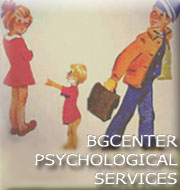
Newsletter
#176 for Internationally Adopting Parents
August 31, 2016
BGCenter
|
Announcements
|
|
|
|
Dr.
Gindis He now offers sessions
in Sedona Call
the main office |
|
|
|
You receive this
newsletter Copyright@2006-2016 |
Preparing For The Adopted Child's Future
At 16 every child with an IEP must have an Individual Transition Plan in preparation for future job skills development and independent living, but for an internationally adopted child it may be too late to begin at this age - the process must begin much earlier to lead the child to such change.
Our counselor Jeltje Simons offers a lot of details on when and how the family should begin the process.Jeltje Simons
Does the thought 'How will he ever manage in life?' sometimes cross your mind? Maybe the thought 'Will I have to manage those behaviors in the coming 10 years?' also make you worry. When the children are young and cute and you're three times bigger, you may not worry about their future too much, but it is better not to sit back and wait in the hope the children mature and gain skills, necessary to live independently, hold on to a job and have healthy relationships with other people. Most adopted children cannot afford the wait and see approach, there needs to be some sort of plan, and waiting until they are 15 before starting to think about their future is a bit late for most. You should give it some thought simply because you need to develop their strengths and interests, and this takes a lot of 'preliminary steps,' so it is better to start as early as possible.
My child feels generally pretty useless; he does not believe he can do a lot, and he's not totally wrong here, as for him to learn anything, he needs to invest more efforts than 'Jane Average'. He makes comments like 'I do not like myself', 'My birth mother has thrown me away', 'Nobody likes me', etc. Low self-esteem, - and that is understandable and also very sad. He is like many other adopted children. That's why it is so important to find activities where they can flourish, feel good about what they do.
My son presents quite able: most people on the outside world see him as capable and cute and have no understanding of the difficulties he faces. They think he can move on to higher education because he plays violin so well, but in reality this is not possible simply because he lacks the intellect, the motivation and perseverance.
Only yesterday he puts himself down saying he has been practicing violin for months and still makes mistakes. 'Of course,' I told him, we started practicing this concert 5 weeks ago and now he can already play the three parts from memory, and that's amazing. It needs to be played from memory as he will play in a festival later this year. Of course he still makes some mistakes, but it is a huge accomplishment, even for a child without his learning difficulties. He then continues about his birth mother, as if he feels that his discontent has nothing to do with his violin. What can you answer when a child says 'My birth mother has thrown me away'? I try to minimize the meaning of these words, tell him it's not really like that, tell him that his birth mother did not see any other choices etc, etc. But the reality is that he lives with me and not with her. She left him in the hospital.
'She did not want me' is the next thing he says. I tell him I think that his birth mother had a lot of problems and could not care for him. No matter what anyone is going to say, it will not make him feel better about himself instantly. He is too young emotionally to understand the circumstances around his abandonment, he comes quickly to very wrong conclusions with the little information he has.Parents and colleagues share their resources with our readers:
Patricia Sarmiento
publichealthcorps.org | team@publichealthcorps.org
340 South Lemon Avenue #5780 | Walnut, CA | 91789
- The Guide to Securing Life-long Accommodations for Adult Children with Special Needs
- Teaching Your Child about Peers with Special Needs
- Creating the Optimal Living Environment for a Child with ADHD
- Autism Service Dogs, Leash-On-Life
- ADHD and Addiction - What is the Risk?
- Supports, Modifications, and Accommodations for Students with Disabilities
- Autism and Addiction: Coping with and Treating Your Dual Diagnosis
- 20 Incredible Colleges for Students with Special Needs
Elena McDermott
To unsubscribe
send
unsubscribe
request


